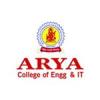Arya College of Engineering & I.T. has many Engineering students face a dynamic and ever-evolving industry that demands a diverse set of skills to succeed. Below are ten essential competencies engineering students should develop before graduating, ensuring they are well-prepared for the challenges of their profession.
1. Technical Proficiency
- A solid foundation in core engineering concepts is vital. Students should master programming languages (e.g., Python, C++, Java), industry-standard software tools (e.g., MATLAB, CAD), and stay updated on technological advancements in their field.
- Hands-on experience through internships and live projects helps bridge the gap between theory and practice.
2. Problem-Solving and Analytical Thinking
- Engineers must excel at identifying, analyzing, and solving complex problems. This includes using mathematical models, analytical tools, and logical approaches to effectively troubleshoot technical issues.
- Real-world case studies and projects enhance critical thinking and innovation skills.
3. Communication Skills
- Effective communication is crucial for conveying ideas to technical and non-technical audiences. Engineering students should hone verbal and written communication skills through presentations, technical reports, and documentation.
- Simplifying technical jargon for stakeholders or clients is also essential.
4. Collaboration and Teamwork
- Engineering projects often require teamwork across disciplines. Students must learn to collaborate effectively, delegate tasks, respect diverse perspectives, and contribute to team goals.
- Participating in group projects or competitions can help develop these skills.
5. Project Management
- Managing projects efficiently involves breaking tasks into manageable parts, setting deadlines, allocating resources, and adhering to budgets.
- Familiarity with methodologies like Agile or Scrum and project management tools is beneficial.
6. Adaptability and Lifelong Learning
- The engineering landscape evolves rapidly with emerging technologies. Students must cultivate adaptability and a mindset for continuous learning by staying updated on trends and acquiring new certifications or skills as needed.
- Flexibility in learning new tools or methodologies is key to staying relevant.
7. Leadership Skills
- Leadership involves motivating teams, delegating tasks effectively, and inspiring others toward shared goals. Engineering students should practice taking initiative in team settings or leading projects.
- Strong leadership enhances career growth potential in managerial roles.
8. Computer Skills
- Proficiency in computer science fundamentals, including coding, computer modeling, and simulation tools, is essential for modern engineering tasks like design optimization.
- Familiarity with digital tools such as CAD software or 3D printing adds value to technical expertise.
9. Attention to Detail
- Precision is critical in engineering due to the complexity of projects that impact safety and functionality. Students should develop meticulousness in design reviews, testing procedures, and documentation.
- A focus on detail ensures high-quality outcomes in professional practice.
10. Advanced Mathematics
- Engineers must understand complex mathematical concepts to solve problems effectively. This includes mastering formulas for design calculations and applying them accurately in real-world scenarios.
- Strong mathematical aptitude underpins analytical thinking across all engineering disciplines.
By mastering these competencies—technical expertise, problem-solving abilities, communication skills, teamwork, project management, adaptability, leadership qualities, computer proficiency, attention to detail, and advanced mathematics—engineering students will be equipped to thrive in their careers while addressing global challenges innovatively.

